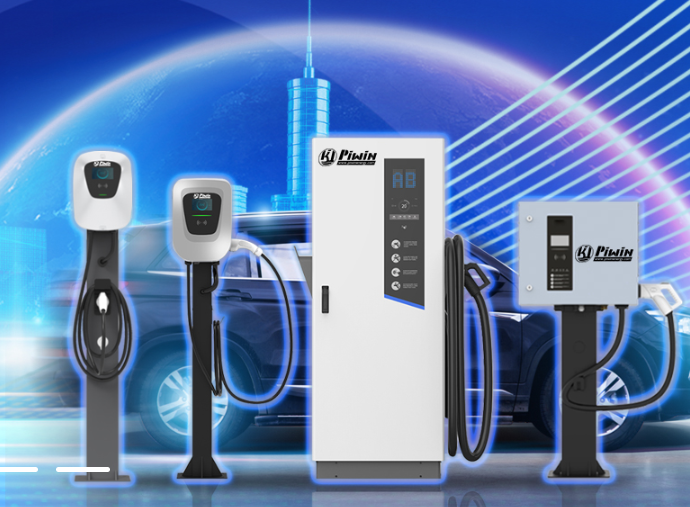
Products
Fast, Reliable, Everywhere

Solutions
Efficient, Innovative EV Charging Solutions.
News
We are committed to the innovation and application of EV charging.
An electric vehicle (EV) charging station that allows for substantially quicker charging than conventional AC chargers is called a DC ev charger, often known as a fast or rapid charger. Fast charging and shorter recharging times are made possible by DC fast chargers, which deliver high-voltage direct current (DC) power to the vehicle's battery.
DC fast chargers avoid needing an onboard converter and supply DC power directly, unlike AC chargers that convert alternating current (AC) from the power grid to DC for charging the vehicle's battery. When speedy charging is required, or long-distance travel is an option, this direct supply of high-voltage DC can greatly shorten charging time. DC fast chargers are available in various power ranges, often from 50 kW to 350 kW or more. The power rating of the charger and the capacity of the electric car being charged determine the charging speed. Faster charging periods are possible with newer EV models, which are frequently compatible with higher-power DC fast chargers.
It's important to remember that depending on the area or nation, different DC fast chargers may have different features and be more or less readily available. The proprietary DC charging standards or connection types used by manufacturers and charging network providers may include CHAdeMO and CCS (Combined Charging System). To assure compatibility across various EV models and charging networks, however, efforts are being undertaken to create global standards and interoperability.
When choosing a charger, you should take the following factors into account:
In recent years, DC electric vehicle (EV) chargers have drawn much attention as an essential part of sustainable urban transportation. DC chargers provide several benefits over conventional AC chargers in terms of charging speed, convenience, and overall efficiency, which are important given the rising demand for electric cars and the need to reduce greenhouse gas emissions. The future of eco-friendly urban transportation is represented by DC ev charger. They have the potential to hasten the adoption of electric cars by offering quicker charging times, more convenience, more efficiency, and integration with renewable energy sources. DC charging infrastructure will be essential in developing an eco-friendly transport system that lowers emissions and contributes to a cleaner, more sustainable future as technology develops. The future potential of DC electric car chargers in environmentally friendly urban transportation is highlighted by the following main points:

Compared to AC chargers, DC chargers offer much quicker charging rates. DC chargers may produce power levels ranging from 50 kilowatts to over 350 kilowatts, whereas AC chargers normally deliver power in the range of 3 to 22 kilowatts. By charging EVs more rapidly and cutting down on time spent at charging stations, this high-power capability makes EVs more useful for daily usage.
DC chargers provide EV owners with more convenience and accessibility. The possibility of charging automobiles during brief pauses, such as at eateries, shopping malls, or rest places along motorways, increases as charging times reduce. Quick battery recharging allows for longer trips and reduces range anxiety, thus encouraging the use of electric vehicles.
DC chargers give power in the same form as needed by EV batteries, unlike AC chargers, which require conversion from AC to DC inside the car. Because of this direct energy transfer, charging efficiency is increased with less energy lost during conversion. Higher efficiency results in less energy and less money spent operating charging stations and EVs.
DC fast chargers have the potential to offer beneficial grid services like demand control and peak shaving. Operators of charging stations with smart charging capability can tailor the charging process to match grid circumstances and load needs. Through this integration, the already available power is used more effectively, putting less strain on the system during moments of high demand.
The advancement of DC charging technologies is accelerating quickly. The options for EV charging are growing with the arrival of ultra-fast charging systems, such as those able to supply power exceeding 350 kilowatts. These developments allow for even quicker charging periods, increasing EVs' use and attraction to a larger spectrum of customers.
The way we charge electric vehicles is changing thanks to DC ev charger. Thanks to this innovative technology, drivers may charge their electric vehicles considerably more quickly. Due to its benefits, this new technology is swiftly embraced by companies and drivers alike. DC chargers are more effective and dependable and provide a more comfortable charging environment. The PIWIN boasts cutting-edge EV charger technology and has expertise working with Fortune Global 500 firms and new-energy car manufacturers. Safe, Intelligent, Green, and environmentally friendly" is the company's product idea. The CE, FCC, ROHS, LVD appearance patents, and other agencies have approved every product. Products are offered for sale both inside and outside the nation, and well-known businesses domestically and abroad have chosen them as strategic partners.
